Chambers finishes his evidencepublished at 11:48 GMT 28 November 2024
Tony Chambers has finished giving evidence. The hearing is on a short break.
When we return, we'll be hearing from former medical director Ian Harvey.
The failure to report the deaths of three babies in one month at the hospital where Lucy Letby worked was a "potential missed opportunity", the former medical director say
Other instances of missed opportunities include those "where there was clear evidence of harm", Ian Harvey tells the Thirlwall Inquiry into how the Countess of Chester Hospital handled the case
He is asked why he told consultants to stop an email chain they had started over concerns, and why he did not attend a meeting following the deaths of two triplet brothers
Earlier, we heard from the hospital's former chief executive, who denied pressuring whistleblowers who raised concerns about Letby
Tony Chambers also rejected stalling the police investigation, describing the allegation as "outrageous"
The Thirlwall Inquiry is investigating how the hospital handled Letby's case - it is not a criminal inquiry. We're not allowed to broadcast it live, but our team of Judith Moritz and Erica Witherington are reporting from the room
Edited by Alex Binley and Jamie Whitehead, with Judith Moritz and Erica Witherington reporting from the inquiry
Tony Chambers has finished giving evidence. The hearing is on a short break.
When we return, we'll be hearing from former medical director Ian Harvey.
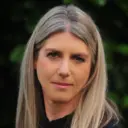 Judith Moritz
Judith Moritz
Special correspondent, reporting from the inquiry
Lady Justice Thirlwall asks Chambers if he ever felt that he was so busy he couldn’t get everything done in his role as CEO.
He says: "There was a culture of very long hours, reading emails early in the morning and late at night and the operational reality of a hospital continues, and the Countess of Chester was a very busy district general so yes, everybody was stretched.”
Lastly, the chair asks Chambers about Letby’s grievance complaint - which was upheld in her favour.
He says this “just made a difficult situation even more difficult".
 Judith Moritz
Judith Moritz
Special correspondent, reporting from the inquiry
Lady Justice Thirlwall says she wants to ask Tony Chambers about his demeanour.
"Your demeanour - you describe yourself as direct and you don’t say this - but plain speaking. Do you accept that some people see that as being somewhat intimidating?"
Chambers says he "described my approach to one meeting as being direct. My style is much more collaborative than that, much more open than that. From my own experience as a chief executive it’s better not to offer your own opinion, because that often closed down discussions."
"So generally you weren’t direct?" the chair asks.
Chambers replies: "No I was much more collaborative than that, much more of a collective leadership style, seeking to listen, seeking to try to understand and always recognising peoples’ contributions."
Justice Thirlwall asks: "Do you think there are ever circumstances when people find you intimidating?"
"There’s no doubt from what we’ve heard in evidence around the meeting of the 29 June that my probably uncharacteristic direct style was more impactful because it was very different to what people would have been used to," Chambers replies.
She asks: "Are you agreeing that that might be intimidating?
Chambers says: "Possibly, possibly. It can be intimidating inevitably because it’s the chief executive who’s having the conversation."
 Judith Moritz
Judith Moritz
Special correspondent, reporting from the inquiry
Lady Justice Thirlwall asks Tony Chambers when he first heard about (lead neonatal consultant) Dr Steve Brearey’s “very clear” request to have Lucy Letby removed from duty.
He says that he’s not sure that he ever did hear about it, at the time. He suggests that the first time he may have been aware of it was at Letby’s criminal trial.
He says the Director of Nursing Alison Kelly (who the inquiry heard from on Monday) didn’t tell him about it, and he didn’t know about it when he spoke to consultants about their suspicions at the end of June 2016.
 Judith Moritz
Judith Moritz
Special correspondent, reporting from the inquiry
The inquiry chair asks Chambers about his regular use of the phrase “what I was hearing” when he talks about meetings with consultants and others.
She asks him - given his degree in communications - whether he means that he was applying filters to what people were saying - and allowing for conscious or unconscious bias.
He says yes.
She asks: "Would it be fair to assume that that would have affected the way you heard what the consultants were saying?”
He answers that that would be fair to assume.
 Judith Moritz
Judith Moritz
Special correspondent, reporting from the inquiry
Lady Justice Thirlwall asks Tony Chambers about his visit to the neonatal unit in December 2015. He previously described the unit as “busy”.
Earlier this morning, he described it as “chaotic”. Lady Justice Thirlwall asks him to clarify.
He says that one of the consultants, Dr ZA, emailed him to say it was chaotic, but when he went to visit it didn’t actually strike him as such - and says that the workload on there was sufficient to enable the doctor to have a cup of tea with him.
 Judith Moritz
Judith Moritz
Special correspondent, reporting from the inquiry
Kate Blackwell KC has finished her questions for Tony Chambers.
The inquiry chair, Lady Justice Thirlwall says she has a few questions for Chambers.
She asks him about his career and what his degree was in.
He answers that his degree was in English, Media and Communications, and he worked as a registered nurse for three years in adult critical care.
 Judith Moritz
Judith Moritz
Special correspondent, reporting from the inquiry
Kate Blackwell KC asks Tony Chambers about evidence which the inquiry has previously heard from former detective chief supt Nigel Wenham who said that in his opinion the executives were trying to shut down concerns, and they were trying to shut the doors on the police investigation.
Tony Chambers says “I am unclear as to how he arrived at that view".
 Judith Moritz
Judith Moritz
Special correspondent, reporting from the inquiry
Kate Blackwell KC asks Tony Chambers about his meeting with the consultants in January 2017.
She refers to suggestions the tone of the meeting was set by him as "intimidating and bullying".
Chambers says he needed to be "clear and direct".
"I was very professional. I didn’t raise my voice I wasn’t angry but it was an odd meeting because the consultants didn’t seem to be able to engage fully in the meeting," he says.
 Judith Moritz
Judith Moritz
Special correspondent, reporting from the inquiry
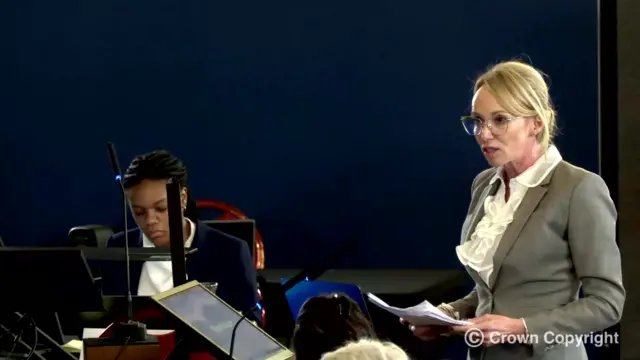 Image source, Thirwall Inquiry
Image source, Thirwall InquiryKate Blackwell KC asks Tony Chambers about his order to the consultants, that they had to apologise to Letby.
She asks: "Was this something that the executive pushed in circumstances where there was an option NOT to ask the consultants to apologise? Or was this something that came out of (Letby’s) grievance process?"
Chambers replies: "It was something that was clearly as a result of the outcome of the grievance process."
 Judith Moritz
Judith Moritz
Special correspondent, reporting from the inquiry
Tony Chambers is now being questioned by his own barrister, Kate Blackwell KC.
She begins by talking to Chambers about the atmosphere in the meeting on 29 June 2016, when he first sat down with consultants to hear their concerns.
He says it was “very open and very friendly and people were very candid. Despite it being a difficult meeting it felt that this was a team of people coming together, trying to resolve some very difficult issues".
Tony Chambers is quoted, in that meeting, as having said “if twins and triplets, why did the trust take them on?”.
He is asked about this. He answers: “I was just surprised that we had this level of complexity and acuity being cared for on our neonatal unit.”
He says that multiple births should have been looked after at a more specialist unit.
He adds "at times the unit felt chaotic”.
 Judith Moritz
Judith Moritz
Special correspondent, reporting from the inquiry
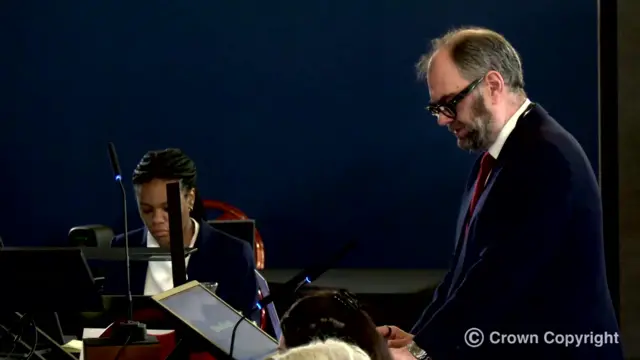 Image source, Thirlwall Inquiry
Image source, Thirlwall InquiryRichard Baker KC is now summing up, accusing Chambers of seeking "at every stage to stall and obstruct the police being called or this being made public".
Bakers tells Chambers he "ultimately sought to ruin the careers of the consultants who brought this to your attention", describing it as "utterly reprehensible behaviour and unfitting of a CEO in the NHS".
Chambers says "had that been what I had done it would be".
"But I think it’s an outrageous statement and I do not believe that it represents my actions," he says.
As a reminder, Chambers said in yesterday's evidence that he decided to contact police on 27 March 2017, but didn't write to the police until 2 May, after consulting a criminal barrister. The first meeting with police was 5 May.
 Judith Moritz
Judith Moritz
Special correspondent, reporting from the inquiry
Richard Baker KC moves on to the failure to tell the babies’ families about concerns that a nurse had caused deliberate harm.
Baker says: "The lack of candour in this case is staggering for one reason - that it kept the families in the dark. You took every step possible to keep the consultants’ concerns from becoming public.
Chambers replies: "It’s a difficult balance between a duty of candour and a duty of care. This was a balance that we were - or I was - trying to get right and it was not something that I got right. I am absolutely clear in my own mind that we could have and should have done better in terms of the communications with the families."
Baker then says: "The Countess of Chester Hospital accepted in their opening statement to this inquiry that there was a total failure by the trust to fulfil the duty of candour. Do you take responsibility for that failing?"
Chambers replies: "This is something in my reflections yesterday that I absolutely acknowledged that we hadn’t got right. We could have done better, we should have done better."
 Judith Moritz
Judith Moritz
Special correspondent, reporting from the inquiry
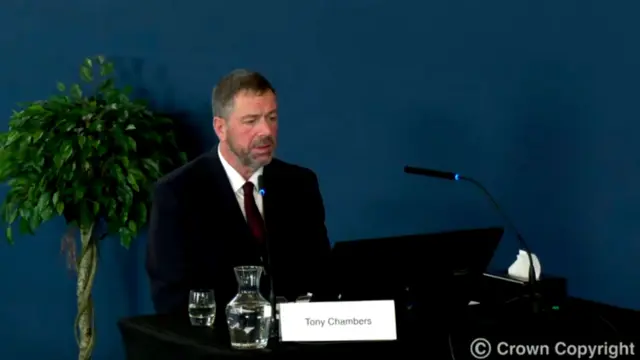 Image source, Thirlwall Inquiry
Image source, Thirlwall InquiryThese notes also show that Tony Chambers told the police that “it will become a wider GMC[General Medical Council] issue” and referred to the consultants “blocking the ability to move forward which creates a more difficult and dangerous environment for sick babies”.
Baker says: "You are making clear that if the consultants do not accept your decision to move on you are going to refer them to the GMC and potentially ruin their careers?"
Chambers replies: "No. That is not what the note represents."
Baker then follows up: "I suggest this shows a clear insight into your character that you were putting pressure on whistleblowers contrary to the hospital's own patient safety and you were planning to have them disciplined, and moved on if they didn’t accept it."
Chambers denies it: "That’s not the interpretation of this or my character. My character is such that we always had a focus on patients’ safety and the well being of our staff."
 Judith Moritz
Judith Moritz
Special correspondent, reporting from the inquiry
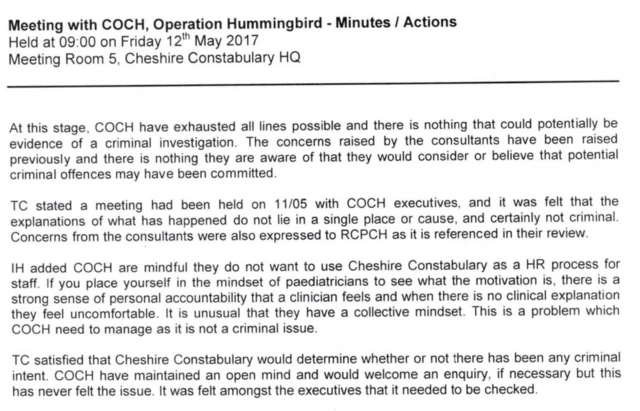 Image source, Thirwall Inquiry
Image source, Thirwall InquiryRichard Baker KC takes the inquiry to notes of a meeting which Tony Chambers attended at Cheshire Police HQ on 12 May 2017.
The notes show that Tony Chambers told the police (who were in the early days of their ‘Operation Hummingbird’ investigation) that “it was felt that the explanations of what has happened do not lie in a single place or cause, and certainly not criminal”.
Baker says: "You are making the point that you do not believe there’s any evidence to warrant a police investigation, and you are misleading the Cheshire Constabulary suggesting to them this matter has been fully investigated."
Chambers replies: "I think I am representing what our thoughts were at the time."
 Judith Moritz
Judith Moritz
Special correspondent, reporting from the inquiry
Tony Chambers says, of the notes above, “These are not my notes, they’re from Sue Hodkinson. I've never seen these notes.
"I don’t remember any discussion around mitigating Speak Out Safely or whistleblowing policies."
 Judith Moritz
Judith Moritz
Special correspondent, reporting from the inquiry
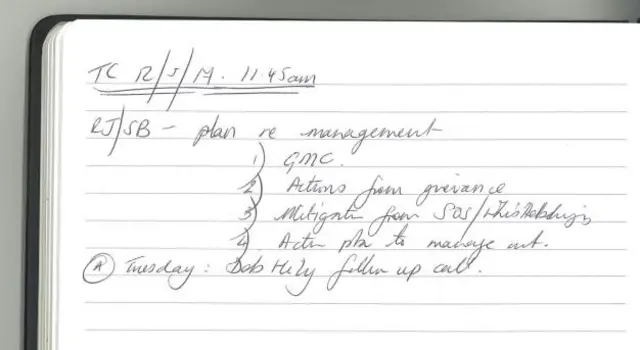 Image source, Thirlwall Inquiry
Image source, Thirlwall InquiryRichard Baker KC moves on, to show the inquiry a handwritten note, from 12 May 2017, which details a conversation that Tony Chambers had with the director of HR Sue Hodkinson, about an action plan for the consultants.
It contains reference to them being referred to the GMC, and includes the line “action plan to manage out”.
It also mentions “mitigation from whistleblowing”.
For background, the inquiry has previously heard that the consultants didn’t have the protection of the ‘Speak Out Safely’ hospital whistleblowing policy.
 Judith Moritz
Judith Moritz
Special correspondent, reporting from the inquiry
Richard Baker KC begins by referring Tony Chambers to his evidence from yesterday.
He says: “You accepted on multiple occasions that the paediatricians were the experts in the room?”
Tony Chambers replies: “They were our experts, they were our doctors and they were the ones that were closest to these issues."
He then goes on to say that the consultants may have been presenting things as clear cut, but “it was not a simple, single thing. We understood from history that it was multifactorial”.
Richard Baker KC picks up Tony Chambers’ point about past cases, from recent history. He cites Harold Shipman and Beverley Allitt.
Chambers says with the Allitt case there was evidence of deliberate harm, to which Baker replies "there was evidence here!".
Chambers replies "what we had were gut feelings and nothing was presented in a very explicit way that would make you feel this was the only explanation for the matters that we were facing".
By way of context, Harold Shipman was a GP exposed as a serial killer, responsible for the deaths of more than 200 patients. He killed himself in 2004.
Beverley Allitt was working at Grantham hospital in Lincolnshire when she killed four children and tried to murder another nine in 1991.
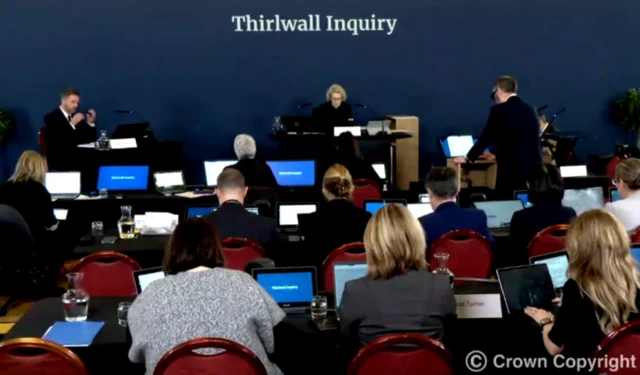 Image source, Thirwall Inquiry
Image source, Thirwall InquiryThe chair, Lady Justice Thirlwall has entered the room and the hearing is beginning
 Judith Moritz
Judith Moritz
Special correspondent, reporting from the inquiry
I’m back in the hearing room at Liverpool Town Hall, for another big moment at the Inquiry.
The public gallery is already filling up, and rows of lawyers are limbering up for a long day ahead.
Yesterday’s evidence with Tony Chambers was expected to complete in one day, but it overran - so he’ll be back in the witness box again this morning, and will face questions on behalf of the babies’ families, and also questions by his own barrister Kate Blackwell KC.
Once Mr Chambers has finished, he’ll be replaced in the witness box by his former colleague Ian Harvey - who was the Medical Director of the Countess of Chester Hospital at the time of Lucy Letby’s crimes.
It will be the first time that Mr Harvey has spoken publicly about how he handled things - and the first time for him to face heavy criticism which has been laid at his door.